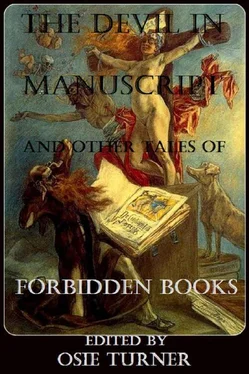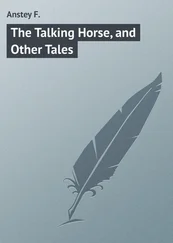I ran forward and took his arm. “What’s the matter, Rupert?” I cried. “What’s wrong with you?”
But he continued to shake with laughter—laughter which made every muscle in his body writhe as though in pain.
“What’s the matter?” I repeated. “Are you mad? Stop that laughing or I’ll shake it out of you! Haven’t you any self-control?”
But still he laughed, painfully, immoderately, with his head thrown back and his eyes staring vacantly at the ceiling. Apparently he did not hear me.
Now Wilbur Huntington took a hand in the game. Stepping forward with unwonted briskness, he tapped Rupert on the chest with a commanding fore-finger. “Burgess Martin wants to know what you think of ‘The Confessions of Constantine,’” he said in a loud, authoritative voice. “Do you hear what I am saying, Rupert Farrington? Burgess Martin wants to know what you think of ‘The Confessions of Constantine.’”
Then a strange thing happened. Rupert’s discordant laughter died away. It was as though it had been bottled up in his throat. His bloodshot eyes left the ceiling and became fixed on Huntington’s face.
“Tell him I like it,” he said thickly. “Tell him it’s true—damn true! A dull knife makes no difference—even a paper cutter will serve. To have one beneath you whom you hate; and then to strike—to strike not once or twice but a hundred times!”
Farrington raised one of his long arms above his head and I saw with horror that his coat sleeve was stained with blood.
“Tell Burgess Martin that I have read ‘The Confessions of Constantine’ over and over again,” he continued in a singsong voice. “Tell him that I have often crept into its pages. It is such a small book; yet I feel that I can find my way into it at will. That door is never locked. It opens readily. Sometimes before one knows it, one is inside. This afternoon I took a walk with ‘The Confessions of Constantine.’ We walked till I met a man who should not live—an editor who should not live!”
“He means Hubbard of the ‘Firefly,’” I whispered to Huntington. “Do you think he has—”
But Farrington broke in upon me. He had lifted his voice to a shout. “The book opened its leaves to me, you understand. I entered a small room. He was sitting with his back turned toward me. There was an inviting ripple of flesh above his collar. Like a luscious bun it bulged out anxiously to receive the knife’s sharp kiss. I hated this man and I approached. But did I hate him after all? Ah, no. Surely I loved him with a great if transitory love! Does the butcher hate the sheep that is bleating in its death agonies? Does the tiger hate the fawn which has fallen to its lot? Surely it is not hatred which makes us kill, but love—love for—”
Farrington broke off suddenly. The color receded from his face; his eyes seemed to be covered with a thin coating of glass. He swayed forward.
“Catch him!” Huntington cried sharply. “He’s going off into a swoon!”
Hardly had he spoken before Rupert fell into my arms. He was a light man, and I had no difficulty in supporting him to the lounge where he promptly collapsed into a senseless heap of humanity. Then I turned to Wilbur with a dawning suspicion of the truth.
“What did he mean?” I cried. “Do you think he has killed anyone?”
Huntington nodded grimly. “I shouldn’t wonder,” he muttered. “Who was the man in the room? Has he quarreled with an editor?”
“Yes and no. He thinks he has a grudge against Hubbard of the ‘Firefly.’ But it was nothing serious —nothing to make a man commit murder.”
Wilbur shook his head. “That doesn’t seem to matter nowadays. Murders are committed for the merest trifles. Yesterday an old chap killed his housekeeper because she forgot to put sugar on his grapefruit. Did you know that Farrington was quoting from ‘The Confessions of Constantine’ just before he caved in?”
“No, I didn’t. I haven’t read the book.”
“Well, he was. I remember the passage distinctly. It’s the most unpleasant thing in the whole damn book. It’s a description of a murder which is supposed to be written by the murderer himself; and while you’re reading it, you feel that you’re sticking the knife in with your own hand!”
“Do you think Rupert’s insane?”
“I don’t know. It seems to me more like a fit—or a hypnotic trance. The man was not responsible for what he did, that’s certain. But I’m going to look into this new book of Martin’s—by Heaven, I am!”
For some time longer we talked in lowered voices with an occasional side-long look at Farrington who had apparently sunk into a deep sleep. The young poet lay on his back—one of his hands dangled nearly to the floor; the other rested on his breast, protruding from the bloodstained coat-sleeve like a white flower from an earthen jug. His small, rather girlish face had regained its habitual calm; now a smile hovered about the lips.
“I shouldn’t wonder if he awoke in his right mind,” Huntington whispered.
At that moment, Rupert opened his large, melancholy eyes. “Where am I?” he murmured.
“It’s all right,” I hastened to assure him. “You’re in my studio. You’ve been sick, Rupert.”
“Sick?” he repeated. “I had a terrible dream. I thought I had killed Hubbard and that I had actually enjoyed doing it.” He smiled weakly.
“Don’t talk too much,” Huntington warned him. “You’re still very weak. You’ll need your strength; later. Why, what’s the matter?”
“My God!” Farrington muttered. His wandering eyes had rested for an instant on his coat-sleeve. Staring at the bloodstained cuff, he repeated dully: “My God! It’s true then—all true!”
“Oh, probably you’ve just cut your wrist a bit,” Huntington said kindly.
“No, it all comes back to me now,” Farrington cried, moistening his lips with his tongue. “I had been reading ‘The Confessions of Constantine’ and somehow I had lost my identity in those pages. I didn’t murder Hubbard—it was someone else who had climbed into my body while my soul was asleep; some red, roaring beast from ‘The Confessions of Constantine’! I know that you fellows can’t understand what I mean! You think I’m trying to get out of this, but I’m not! I’m willing to pay the price!”
“Hush,” said Huntington, “I hear footsteps in the corridor.”
Suddenly the sound of heavy knocking echoed through the room. Someone was pounding on the studio door.
“Come in,” I called.
Now the door swung slowly open and two policemen stepped into the room. Glancing about curiously, their eyes finally rested on Farrington.
“Well?” said Huntington sharply.
“Is Mr. Farrington here?” the taller policeman asked.
Rupert rose and confronted them. “That’s my name,” he said quietly. “What do you want of me?”
“You’re wanted for the murder of J. E. Hubbard, editor of the ‘Firefly,’” the officer answered, stepping up to Rupert and slipping a pair of handcuffs on his slender wrists. “You’d better go quietly, sir.”
“Very well,” Farrington answered. And then turning to me with a brave smile which wrung my heart, he said in a voice that trembled only very slightly: “Smithers, you have won our last bet. I am sorry—damn sorry!—that I ever read any of Martin’s work!”
Weeks passed and still the crime wave swept the city. One had but to glance at the papers to see how widely this homicidal plague had spread. Other towns soon became infected. Boston, Philadelphia, and Chicago suffered even more severely than New York; and, strange to say, the police annals proved that these modern murderers sprang, not from the illiterate, uneducated classes as one might fancy, but from the reading public and more especially from the highest intellectual types.
Читать дальше












